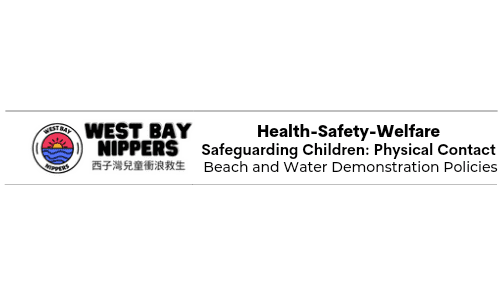
Beach Demonstration
The coach will show safety plans and skills on the beach with a hands-off approach.
Guidelines
- Motivate children of all ages to be as independent as possible
- Give verbal help and encouragement
- Parents/Guardians can offer physical assistance to their child
If physical contact is required in the water, for example, to provide support or safety, the coach must clearly explain to the child in advance on the beach, and they can opt-out of the activity.
Water Demonstration
Physical contact in the water should always occur for the child’s welfare and benefit. It may be appropriate, necessary, and practical for the coach to make physical contact with a child to aid their safety and lessen the risk of injury due to wipe-outs, incorrect dismounts, or mistakes when performing a skill.
If it’s critical to give a child skill development assistance in the surf, coaches should always do so openly and in sight of others.
The coach will frequently remind children that they have the right to say what level of physical contact they are comfortable with and should feel that this is always listened to and respected.
Note: Coaching lessons can reaffirm children’s right to choose how or if their body is handled and say no to uncomfortable and embarrassing coaching methods.
Examples of the coach asking for permission:
- Can I place my hand on your back to explain and demonstrate the correct position?
- Do you mind if I put my hand on your wrist to guide you through the skill movement?
- If a big wave is approaching, is it okay if I hold the board and your body to protect you from danger?
The coach should:
- Ensure that physical contact does not become unnecessary or unjustified contact, notably repeatedly with the same young person
- Understand that well-intentioned physical contact (e.g., putting a hand on the shoulder or arm) can if repeated regularly, lead to the participant feeling uncomfortable and perceived by others as unsuitable behavior
- Remind all participants that we have various limits and preferences about physical space and touching.
- Encourage participants to voice their concerns if physical contact makes them feel uncomfortable or threatened.
- Understand that physical contact must not involve touching buttocks, genital areas, breasts, or other body regions that might result in distress or embarrassment.
- Always demonstrate coaching skills and physical contact in an open or public environment, not secret or out of sight of others.
Specific Situations
1.1 In the case of a young person with a disability, implement specific support or assistance and physical contact safety guidelines with dignity and respect.
1.2 Physical punishment and any form of physical response to misbehavior are unlawful. The coach may be required to use appropriate physical intervention to prevent a participant from:
- Harming themselves
- Harming others
- Damaging property
Adults must understand this both to protect their position and the overall reputation of West Bay Nippers in which they are involved.
Distress and Success
Appropriate physical contact during distress and success is a natural and human response and should not be discouraged. Participants should be aware of the limits within which physical contact should adequately occur and the possibility of misinterpretation by other observers.
The coach should expect distress and success situations to occur and follow guidelines outlining acceptable types of physical contact. For example:
- Establish boundaries to create a safe coach-athlete relationship and environment
- Non-intrusive comforting and reassurance gestures include a hand on the upper arm or upper back.
- Non-intrusive congratulative gestures include shaking hands or patting the upper arm or back. Ensure hugs or other gestures are normal and natural and do not become unnecessary and unjustified physical contact, notably repeatedly with the same participant.
Safe and appropriate physical contact may take place, only when necessary, to:
- Treat an injury
- Prevent an injury or accident from occurring
- Comfort a distressed child or celebrate their success
CPSU BRIEFINGS: Physical Contact and Young People in Sport

